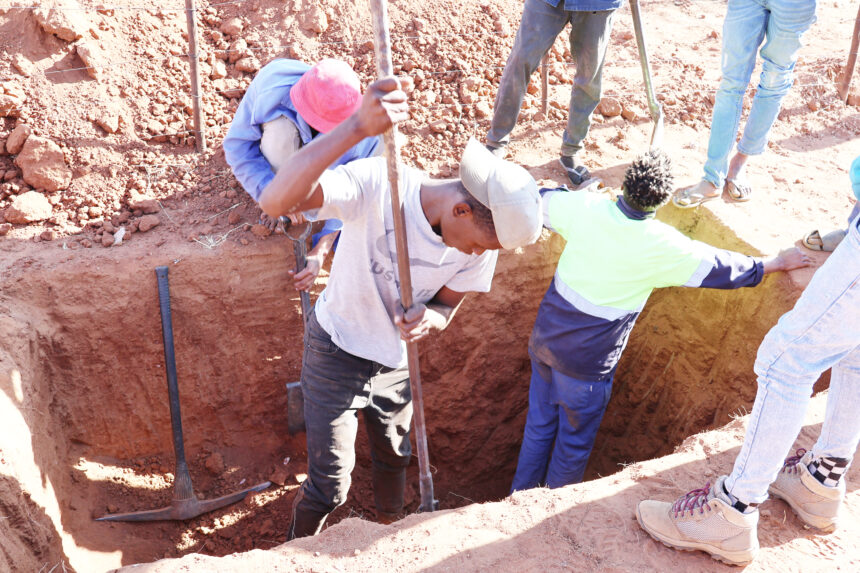Lahja Nashuuta
Windhoek Rural Constituency councillor Pieter Adams has reminded the government that the Dordabis community is still waiting for a farm promised by the State.
The land promise was made to cater for a community of around 3 000 people who currently reside on a cramped 10-hectare piece of land.
The affected community is struggling to keep up with land scarcity, and does not even have space to bury their family members.
One of the community members, who preferred to speak on condition of anonymity, told New Era that they must seek permission from the farm owner to bury their loved ones, for which they are charged N$600. This was confirmed by the constituency councillor.
“That’s a common practice at most privately-owned farms in the Khomas region, where most //Khomanin communities reside. A week ago, the Witbeen family was refused access to a burial site, and had to forcefully bury their loved one in Autabib. These are some of the ordeals our people endure daily,” Adams stated.
He added that the issue of burial sites has become a grave concern, especially in the areas of Autabib, IGarieb and Stinkwater. “It is clear that these so-called farmers who are denying access to community members’ burial sites are in actual fact depending on the government to provide them with basic needs” he said.
Adams maintained that the Khomas region has been without communal land for the past 34 years, and the resettlement programme is being implemented at a snail’s pace.
“The current situation forces our people to live as generational farmworkers, while others who are not privileged and are unemployed live at the mercy of private landowners. A substantial number of people cannot afford to live in cities and towns that are part of the Khomas region,” he maintained.
He added that although generational farmworkers have been profiled in the past, one wonders what really happened to the information collected.
The current resettlement criteria did not clearly state how the affected groups or communities, like generational farmworkers, would benefit.
This is particularly pertinent to those claiming ancestral land rights, and those forced to live in the corridors between farms, the councillor continued.
“We have heard rumours that Farm Keerwater near Dordabis, which was recently bought by the government, is earmarked for beneficiaries from the Omaheke region. Therefore, I am challenging the government to come clean whether this is true or false,” said Adams.
Living conditions at farms
He said Farm Versailles, approximately 150 km south-east of Windhoek, has been allotted to 86 beneficiaries. Currently, the number of people on the farm is more than 200, which leads to overgrazing and unending water challenges.
Meanwhile, native Groot Aub farmers are being pushed out by the City of Windhoek (CoW) due to the extension of the city’s boundaries to a 70 km radius area.
Adams revealed that farmers at Satanslocht, which is a commonage farm owned by the CoW, are regarded as illegal settlers. Farmers who wanted to obtain stock brands and ear tags were reportedly blocked by the CoW because they are regarded as illegal settlers.
“Up to now, the evicted Namiseb family from Autabib (another private farm) tried to apply for a resettlement farm, but have not been successful,” the councillor noted.
Stinkwater is regarded as a private farm. Its population stands at close to 2 000 residents, whose families have been living in the area since before independence. A few years ago, a group from Gubagub, which refers to the Skaap River, held a peaceful demonstration to demand ancestral land rights, but have been ignored by the government up to now.
Adams said at Nauaspoort, which belongs to the Ministry of Agriculture and Land Reform, the illegal sale of land has become a daily occurrence. Also, for the past two years, they have been waiting for the planned demarcation, but this has not happened.
Farm Areb, a resettlement farm approximately 130 km southwest of Windhoek, is divided into three portions – 176, 202 and 909. Part 909 is occupied by a private individual, who denies access to the elderly community to farm at 202.
Adams claimed that although 909 is registered under Kubitsaus (Pty) Ltd, which is a farm on its own, paperwork found at the Rehoboth Deeds Office shows the land still belongs to the government.
“One wonders how government land ends up in the hands of a private individual who was not resettled. Several letters written to the Ministry of Agriculture have landed on deaf ears,” he said.
The constituency councilor furthermore revealed that the owner of Farm Corona and Picadilly in the Gamsberg area passed away while he was in Germany. However, for more than a decade, this farm is being run by the manager, who threatens workers with evictions.
Audience with minister needed
Meanwhile, Adams has penned a letter to land reform minister Calle Schlettwein, calling for the government to investigate cases of farms where //Khomanin are residing.
“These private farms have become a liability to the government…We provide them with water and all the basic needs, hence my plea to the government to enter negotiations with willing farmers to buy these farms to address the current land challenges, especially in the Dordabis, Versailles and Autabib areas,” he emphasised.
He further urged the government to stop the individual resettlement process that he says only benefits a few elites or connected people, and to instead resettle groups. Government should likewise do a thorough assessment of the situation in Dordabis, Stinkwater, Autabib, IGarieb, Kanobib, Kappsfarm, Neudamm farms, Groot Aub, Mix, Satanslocht and Baumgartsbrunn, and prioritise it accordingly.
He stressed that it is long-overdue to also look at the plight of the Namiseb family, and the family opposite the Aris Primary School.
“In an interview with New Era recently, I acknowledged the land issue for the
//Khomanin community, confirming that so far, government has managed to buy three farms for //Khomanin resettlement purposes,” said Adams.



